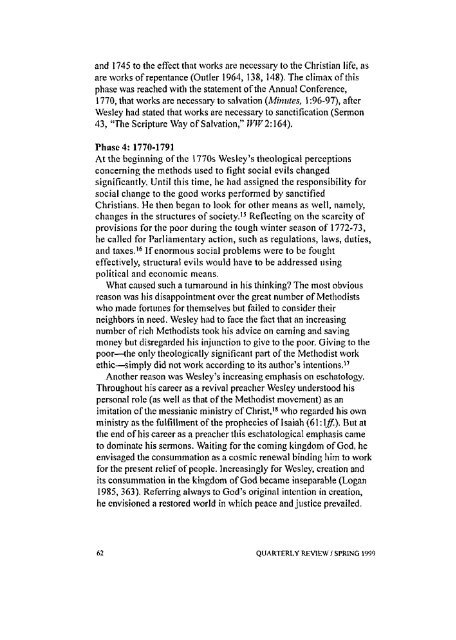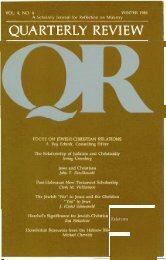Spring 1999 - Quarterly Review
Spring 1999 - Quarterly Review
Spring 1999 - Quarterly Review
You also want an ePaper? Increase the reach of your titles
YUMPU automatically turns print PDFs into web optimized ePapers that Google loves.
and 1745 to the effect that works are necessary to the Christian life, asare works of repentance (Outler 1964, 138, 148). The climax of thisphase was reached with the statement of the Annual Conference,1770, that works are necessary to salvation (Minutes, 1:96-97), afterWesley had stated that works are necessary to sanctification (Sermon43, "The Scripture Way of Salvation," WW2\\6A).Phase 4: 1770-1791At the beginning of the 1770s Wesley's theological perceptionsconcerning the methods used to fight social evils changedsignificantly. Until this time, he had assigned the responsibility forsocial change to the good works performed by sanctifiedChristians. He then began to look for other means as well, namely,changes in the structures of society. 15Reflecting on the scarcity ofprovisions for the poor during the tough winter season of 1772-73,he called for Parliamentary action, such as regulations, laws, duties,and taxes. 16If enormous social problems were to be foughteffectively, structural evils would have to be addressed usingpolitical and economic means.What caused such a turnaround in his thinking? The most obviousreason was his disappointment over the great number of Methodistswho made fortunes for themselves but failed to consider theirneighbors in need. Wesley had to face the fact that an increasingnumber of rich Methodists took his advice on earning and savingmoney but disregarded his injunction to give to the poor. Giving to thepoor—the only theologically significant part of the Methodist workethic—simply did not work according to its author's intentions. 17Another reason was Wesley's increasing emphasis on eschatology.Throughout his career as a revival preacher Wesley understood hispersonal role (as well as that of the Methodist movement) as animitation of the messianic ministry of Christ, 18who regarded his ownministry as the fulfillment of the prophecies of Isaiah (61:1$). But atthe end of his career as a preacher this eschatological emphasis cameto dominate his sermons. Waiting for the coming kingdom of God, heenvisaged the consummation as a cosmic renewal binding him to workfor the present relief of people. Increasingly for Wesley, creation andits consummation in the kingdom of God became inseparable (Logan1985, 363). Referring always to God's original intention in creation,he envisioned a restored world in which peace and justice prevailed.62 QUARTERLY REVIEW / SPRING <strong>1999</strong>












